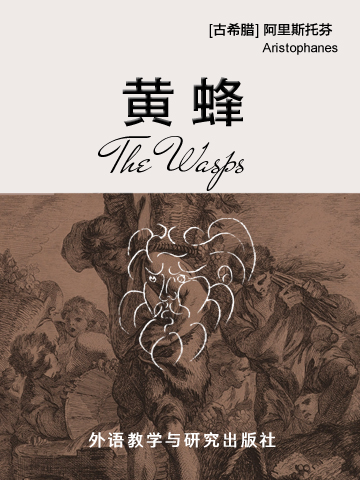(SCENE:-In the background is the house of PHILOCLEON, surrounded by a huge net. Two slaves are on guard, one of them asleep. On the roof is BDELYCLEON.)
SOSIAS (waking XANTHIAS UP)
Why, Xanthias! what are you doing, wretched man?
XANTHIAS
I am teaching myself how to rest; I have been awake and on watch the whole night.
SOSIAS
So you want to earn trouble for your ribs, eh? Don't you know what sort of animal we are guarding here?
XANTHIAS
Aye indeed! but I want to put my cares to sleep for a while.
(He falls asleep again.)
SOSIAS
Beware what you do. I too feel soft sleep spreading over my eyes,
XANTHIAS.
Are you crazy, like a Corybant?
SOSIAS
No! It's Bacchus who lulls me off.
XANTHIAS
Then you serve the same god as myself. just now a heavy slumber settled on my eyelids like a hostile Mede; I nodded and, faith! I had a wondrous dream.
SOSIAS
Indeed! and so had I. A dream such as I never had before. But first tell me yours.
XANTHIAS
I saw an eagle, a gigantic bird, descend upon the market-place; it seized a brazen buckler with its talons and bore it away into the highest heavens; then I saw it was Cleonymus had thrown it away.
SOSIAS
This Cleonymus is a riddle worth propounding among guests. How can one and the same animal have cast away his buckler both on land, in the sky and at sea?
XANTHIAS
Alas! what ill does such a dream portend for me?
SOSIAS
Rest undisturbed! Please the gods, no evil will befall you.
XANTHIAS
Nevertheless, it's a fatal omen when a man throws away his weapons. But what was your dream? Let me hear.
SOSIAS
Oh! it is a dream of high import. It has reference to the hull of the State; to nothing less.
XANTHIAS
Tell it to me quickly; show me its very keel.
SOSIAS
In my first slumber I thought I saw sheep, wearing cloaks and carrying staves, met in assembly on the Pnyx; a rapacious whale was haranguing them and screaming like a pig that is being grilled.
在作者仅存的11部作品中,本作品是第四个。本作品创作于公元前422年的古希腊,但是这部作品中却对立法议会做出了批判,此作品和其他作品比起来更加优秀,已经被誉为全世界最优秀的喜剧作品之一。
The Wasps is the fourth in chronological order of the eleven surviving plays by Aristophanes, the master of an ancient genre of drama called 'Old Comedy'. It was produced at the Lenaia festival in 422 BC, a time when Athens was enjoying a brief respite from the Peloponnesian War following a one year truce with Sparta. As in his other early plays, Aristophanes pokes satirical fun at the demagogue Cleon, but in The Wasps he also ridicules one of the Athenian institutions that provided Cleon with his power base: the law courts. The play has been thought to exemplify the conventions of Old Comedy better than any other play, and it has been considered to be one of the world's greatest comedies.
- WASPS
- 书评 写书评
- 笔记
-
书评加载中...























 京公网安备 11010802032529号
京公网安备 11010802032529号
笔记加载中...